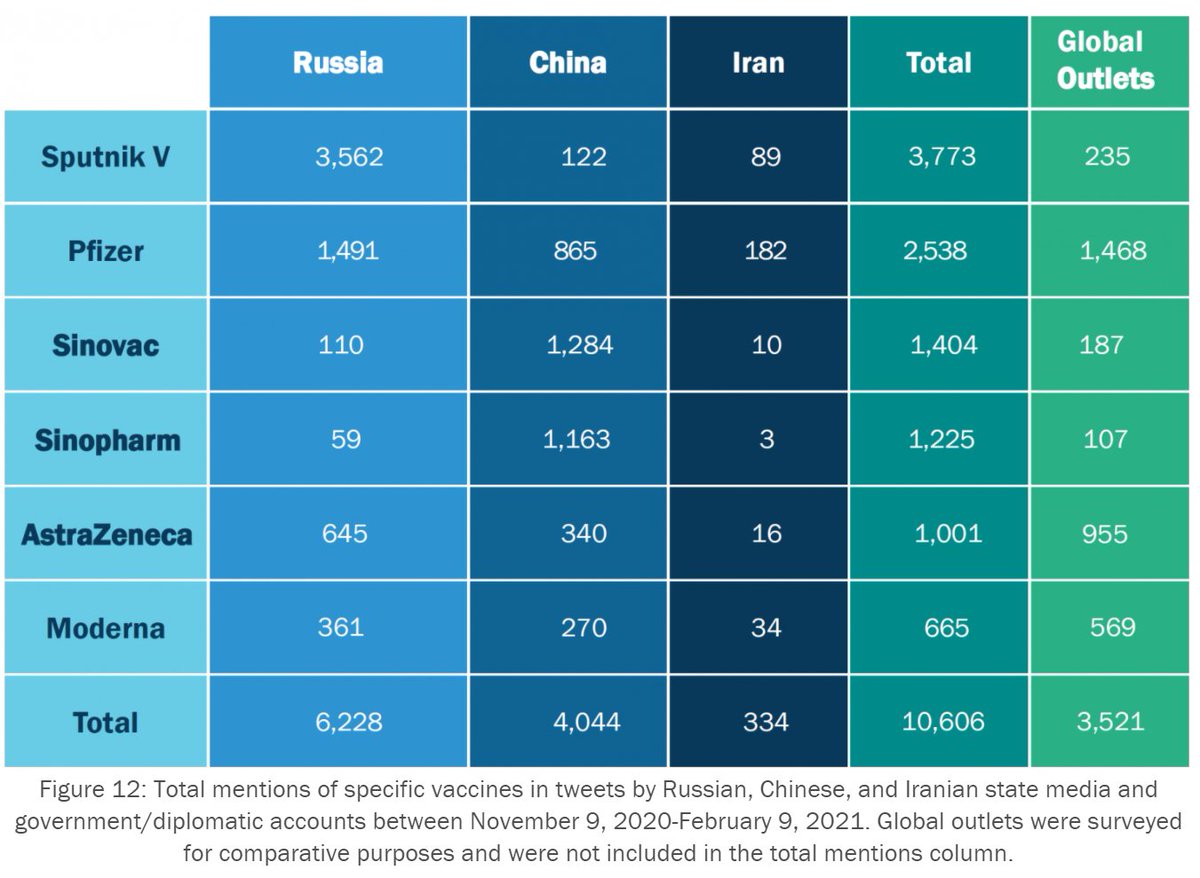
Russia, China, and Iran have been carrying out info operations to manipulate narratives around #coronavirus vaccines.
ASD analyzed >35,000 vaccine-related messages captured on our Hamilton 2.0 dashboard to understand the impact of these ops. securingdemocracy.gmfus.org/russia-china-i…
ASD analyzed >35,000 vaccine-related messages captured on our Hamilton 2.0 dashboard to understand the impact of these ops. securingdemocracy.gmfus.org/russia-china-i…
While Russia, China, & Iran covered specific vaxes differently, they shared a common goal: to convince domestic & int'l audiences that their vaccines (or, in Iran, vaccines approved for use) were safer, more effective, & more affordable than certain vaccines produced in the West.
The Pfizer vaccine was mentioned more often by Russian, Chinese, & Iranian accounts than the Moderna & AstraZeneca vaccines combined. Russia was especially likely to suggest links between the Pfizer vaccine & the subsequent deaths of recipients. wsj.com/articles/russi…
Russia’s coverage of Oxford-AstraZeneca took a noticeable U-turn after a Dec. announcement of a deal to test a combination of the Oxford-AstraZeneca and Sputnik V vaccines. After the announcement, there was an increase in positive reporting and a reduction in negative coverage. 



Russia and China aggressively promoted their own vaccines, but not one another’s. In Russian tweets that mentioned a vaccine by name, just over 6% mentioned one of the two Chinese vaccines. In Chinese tweets that mentioned a vaccine by name, just under 3% mentioned Sputnik V. 



Both Russia and China pitched their vaccines to developing countries. For ex, China emphasized that its vaccines are “global public goods” that are more practical for distribution in the Global South (as opposed to Western vaxes that are being prioritized for the “world’s rich”) 

Russian, Chinese, and Iranian state media outlets all promoted the theory that “mainstream” media outlets provided biased coverage of Russian and Chinese vaxes and ignored safety concerns of Western vaxes—a claim that our research suggests is inflated if not entirely inaccurate. 

Contrary to the belief that Russia, China, & Iran targeted all Western vaccines with negative messaging, our data indicates that their info strategies represent a balancing of public health needs, economic pursuits, geopolitical posturing, & other strategic interests.
While there were few instances of any studied country promoting verifiably false information about vaccines, reports of safety concerns related to the administration of Western-produced vaccines were often sensationalized while downplaying or completely omitting key context.
This highlights the challenge of combating malinformation, as these half-truths and exaggerations, repeated as often as they were, were arguably just as damaging as falsehoods, and certainly harder to fact-check and moderate. securingdemocracy.gmfus.org/russia-china-i…
• • •
Missing some Tweet in this thread? You can try to
force a refresh







